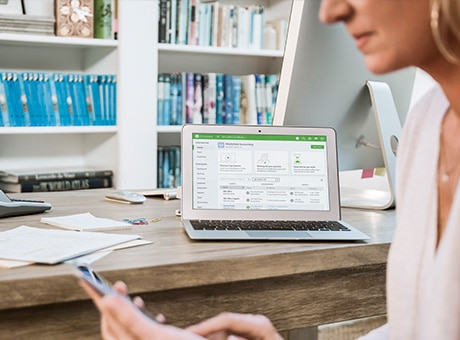Cryptocurrency is a kind of online money that only exists in transactions between computers. Unlike paper currencies, which are usually issued by governments, cryptocurrencies such as Bitcoin transfer from one holder to another in a fully transparent open-source chain—a chain of information that provides time stamps at every stage to (in theory) keep everyone honest.

How to Accept Cryptocurrency in Your Business
What is Cryptocurrency
Cryptocurrency a digital form of money designed to protect financial transactions, control the amount of currency available, and verify transfers. The value of each type of cryptocurrency varies depending on the market’s demand. This means you may make or lose money based on the amount of cryptocurrency you have, what you paid for it, and its current value.
For example, say you bought two bitcoins for $500 each. If Bitcoin currently trades at $700 per bitcoin, you can reap a profit of $400 if you sell them now.
Bitcoin is one of several blockchain-based currencies. A blockchain records all transactions in a public and chronological order. When first introduced, these currencies were the domain of speculators and traders only, but several of these have now matured to the point where people can actually buy things with digital money. If your business is ready to accept those payments, you can jump into a commanding lead in what promises to be the Next Big Thing in retail, both online and off.
If you run a brick-and-mortar retail store, you probably have a point-of-sale system at your cash register. You can upgrade Modern POS machines with a Bitcoin wallet program that’s just as fast and easy as a credit or debit card purchase. When a customer offers Bitcoin, you just type in the price and send the data. That generates a QR code that the customer can scan to complete the transaction. These wallet apps charge a percentage of every transaction, and some even let you print a receipt.
Online or in-person businesses ranging from auction websites to kids’ lemonade stands don’t even need a POS machine. Just downloading a cryptocurrency app to your smartphone or tablet does the trick. Usually, transfers between parties require scanning a QR code, inputting a code string, or just bumping phones together. Some of the most popular wallet apps are:
- Coinbase and CoinKite: These work with existing POS machines, generate paper trails for customers, and also work online.
- MyEtherWallet: This less-traditional online wallet app creates your wallet without an account, generates downloadable records, and works with both Windows and Mac OS.
- Sia Coin Wallet: Sia is the Windows official Bitcoin app, and it’s built for very secure transactions, such as financial and investment operations.
Bitcoin and other cryptocurrencies may be the wave of the future for retail. With the right apps, you can start accepting them before most of your competition even knows that the possibility exists.
Bitcoin
The first time you heard about cryptocurrency, the name you heard was probably Bitcoin. This form of cryptocurrency remains one of the most popular and well-known versions of cryptocurrency.
Benefits of Bitcoin
Bitcoin fraud is rare. That reduces your risks as a merchant, and chargebacks are impossible with bitcoins. Once you receive payment, the merchant cannot reclaim the funds unless you issue a refund. Also, when your company accepts bitcoins, it puts you on the radar of shoppers who prefer to use Bitcoin.
Bitcoin payment processors tend to charge about 1% of each transaction, which is lower than the fees charged by many credit card processors. Over time, those savings can add up.
For example, if you earn $2 or $3 extra from every $100 in sales, you increase your profits by $600 to $900 per year based on $30,000 in revenue.
Accepting Bitcoin
To accept Bitcoin on your website, you need to work with a company such as BitPay or Shopify that processes Bitcoin payments. If you want to accept Bitcoin in your brick-and-mortar shop, BitPay offers apps that sync its services to a range of point-of-sale programs. If your POS system cannot sync with BitPay, Bitcoin Checkout allows you to accept these payments in person with your mobile phone.
If you cannot set up Bitcoin processing and you have clients who want to pay with bitcoins, you may want to refer them to a service such as Bylls. This company makes it possible for Canadians to use Bitcoin to pay a range of bills. Alternatively, apps such as Invoiced let you send invoices and set up subscription billing. This program works with digital currencies as well as traditional types of payment.
Converting Bitcoins
In most cases, Bitcoin payment processors convert the funds to Canadian dollars immediately, and they dispatch the money to your bank account, just as most credit card processors do. However, if you prefer to keep the currency in Bitcoin, you need to understand how shifting exchange rates may affect your income tax obligations.
As of 2017, if you earn more than $200 in a currency exchange, you must report the excess amount as a capital gain on your tax return. For instance, if you accept 2 bitcoins with a value of $2,040, but they’re worth $3,040 when you convert the funds to Canadian dollars, you have a capital gain of $800 – the $1,000 you earned through the exchange minus the $200 threshold.
Taxes
When you accept bitcoins for business sales, you must report the revenue as usual to the Canada Revenue Agency (CRA). You should convert the Bitcoin value to Canadian currency using the exchange rate on the day of the transaction. If you spend bitcoins on business purchases, you also need to convert the amount to Canadian dollars before noting the expense on your tax return.
Exploring Other Types of Cryptocurrency
Bitcoin (BTC) has evolved from an obscure internet currency to a household name. Early adopters enjoyed substantial monetary gains, and many new cryptocurrency enthusiasts hope for the same results. But what if you want to explore some other type of cryptocurrency?
While Bitcoin remains the most well-known cryptocurrency, plenty of other digital tokens utilize blockchain technology, and many still have significant room to grow. People refer to these lesser-known tokens as altcoins. Many of them have different functions and goals beyond just acting as a way to store and transfer value. Understanding the details regarding the most exciting altcoins out today can help you make an informed investment.
The Price of Altcoins
As you look into cryptocurrency, you’re likely to notice that the value of tokens varies widely, and those prices change by the minute. While it’s tempting to seek out the least expensive altcoins, the reality is that a token’s value varies with its market cap, which you find by multiplying the coin’s price by its circulating supply. For example, if a coin’s price is $200, and there are 1,000 coins on the market, then the market cap is $200,000.
Coins with low market caps may cost more, but they also have plenty of potential to continue growing in value—and as an investor, you want the potential to grow. You can purchase most high-value coins in fractions as well, so don’t let the price of one coin determine whether or not you invest. Instead, read the white papers about each altcoin, then invest if you believe in the long-term potential of the coin.
Ethereum (ETH)
Ethereum is arguably the most popular of all the Bitcoin rivals. Fans of Ethereum love this coin because it’s an open, decentralized software platform that allows you to take out smart contracts and build applications according to your needs. A smart contract is one in which the terms of an agreed-upon contract fulfill automatically when other terms are met.
For example, if you plan to purchase goods from China to resell at a higher price in Canada, and you don’t want to pay for all of the goods up front, you can negotiate a smart contract that allows you to pay half now and half later. Once the agreed-upon amount of time passes, and you’ve had the chance to recoup your investment plus profit, the other half of your bill fulfills automatically using the Ether currency. Essentially, the Ethereum network allows you to create “when-this-happens-then-this-happens” contracts that no one can alter once the contract is set in place, ensuring that both parties reach their desired outcome.
VeChain (VET)
VeChain is another altcoin that goes beyond the standard use as currency. It’s a supply chain network that allows your company to track the origins and movements of products across the entire supply chain. It’s especially useful for preventing counterfeit goods.
For example, your luxury handbag company can incorporate scanable VeChain chips into its products. When someone scans the chip, information about the manufacturing process automatically transmits to the VeChain blockchain, proving the handbag is authentic.
Being able to identify exactly where goods originated proves that they’re real. The VeChain token, VET, is the in-house currency that companies pay to use the VeChain network. As of 2018, VeChain continues to expand its reach, with goals of creating a large-scale platform similar to Ethereum.
Litecoin (LTC)
If Bitcoin is gold, Litecoin is silver. Litecoin is essentially a more streamlined version of Bitcoin. As of 2018, it’s quite a bit cheaper than Bitcoin, and you can send it faster. Litecoin’s main use case is to send a large volume of small transactions quickly.
Ripple (XRP)
Most cryptocurrencies were created as alternatives to traditional banking institutions, but Ripple aims to work with banks. Ripple’s goal is to facilitate fast, affordable payments from anywhere in the world. Ripple is similar to Western Union in that you can send money virtually anywhere, but it’s faster and cheaper, saving your small business both time and money.
Monero (XMR)
Privacy is one of the most appealing aspects of cryptocurrency for many users, and Monero takes that concept a step further. While Bitcoin is anonymous, you can still view transactions on the blockchain. Monero is completely untraceable, giving individuals and businesses the ultimate in privacy.
IOTA (MIOTA)
Unlike most cryptocurrencies, IOTA doesn’t rely on blockchain technology, instead using its own distributive ledger system called Tangle. The name stands for Internet of Things Application. The token’s creators and investors hope that as the internet continues to grow, all sorts of devices connect to each other. IOTA’s uses include facilitating free micropayments for your small business within the IOTA ecosystem.
Where to Buy Altcoins
If you plan on buying altcoins, you may need to buy one coin and then transfer it to an exchange where you can exchange it for your preferred token. As of 2018, the most popular place to buy Bitcoin, Bitcoin Cash, Ethereum, and Litecoin is Coinbase. Coinbase accepts many different payment methods, including CAD, allowing you to buy coins with your bank account, debit card, or credit card. Once you purchase one of those coins, you can send it to an altcoin exchange if you want to switch it out for an altcoin. Binance is the most popular altcoin exchange.
Before you invest in cryptocurrency, do your homework. The cryptocurrency arena can be risky, but you can reduce that risk by educating yourself. You may want to join online communities and talk to people who own cryptocurrency so you can get a well-rounded view of the market. Do your due diligence, and remember that cryptocurrency is a long-term investment. It may be a bumpy ride along the way, but blockchain technology has enormous potential.
Only invest what you can afford to lose, and make sure you store your coins safely in a trusted online or offline wallet. As a small business owner, you know that tracking profits, payments, and accounts receivable is an essential task. QuickBooks Online can help you get paid faster. Start accepting payments today with QuickBooks.
<<Back: What are Different Forms of Payment?


